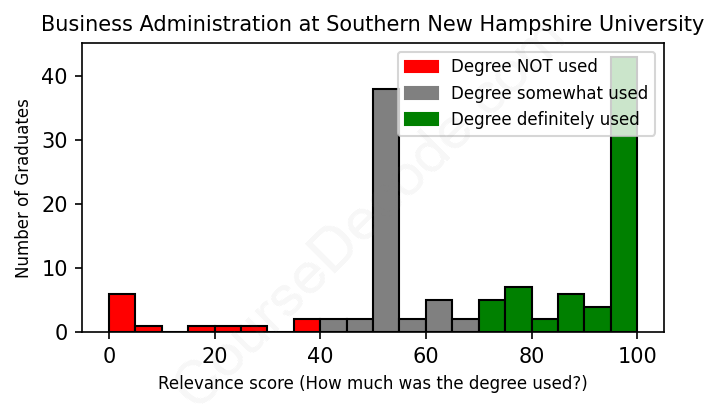
First, some facts. Of the Business Administration graduates from Southern New Hampshire University we've analyzed , here's how many have used (or NOT used) their degree in their career:

These are estimates based on AI analysis of 130 LinkedIn profiles (see below).
The verdict? Slightly above average. Overall, with an average relevance score of 69%, Business Administration graduates from Southern New Hampshire University have a slightly higher likelihood (+2%) of finding work in this field compared to the average graduate across all fields:
And for comparison, here's the chart for all profiles we've looked at across all degrees.
Also, after graduating, only 20% of these graduates have pursued further education other than another Bachelor's degree (such as a Masters degree or other), compared to the average across all profiles of 35%. This suggests a Bachelors degree is enough for most Business Administration graduates, and it's normal to look for work straight after graduation.
See the details:
|
Relevance score: 100% We think this person has gone into a career highly relevant to their degree. We think this person has gone into a career highly relevant to their degree.
DEGREE INFOGraduated in 2019 from Southern New Hampshire University with a Bachelor of Business Administration - BBA in Business Administration. No other secondary education since. JOB HISTORY SINCE GRADUATIONGeneral Manager Omnicare, a CVS Health company Jul 2023 - Present ABOUTNo information provided. |
The top 10 most common jobs done by the graduates we've analyzed (ranked most common to least) are:
When looking at the career paths of graduates from Southern New Hampshire University with a degree in Business Administration, it's quite evident that the variety of roles they occupy is huge. A lot of the jobs range from management positions like Operations Managers and Project Managers to various roles in finance, human resources, and customer service. The representation of roles greatly indicates that graduates have entered both conventional business sectors, such as finance, and specialized areas like healthcare and customer service. This diversity of roles points to the versatility of a Business Administration degree, which allows graduates to adapt and fit into multiple industries.
As for relevance to their degree, the connection varies quite a bit. It's clear that many graduates fill positions that directly utilize skills gained through their education, particularly in finance, client management, and operational oversight. For instance, roles like Financial Analyst, Operations Manager, and Project Manager show a significant alignment with business principles. However, there are also numerous positions that appear unrelated. Jobs in customer service or administrative roles might not require the in-depth understanding of business management principles taught during their studies. In some cases, such as work in the healthcare sector, while some administrative skills are applicable, the positions may not leverage the full extent of a business administration education.
Many graduates have taken roles where they apply business fundamentals regularly, such as management, financial analysis, or strategic planning. However, a considerable number of graduates end up in positions where their business education is only tangentially relevant. Customer service representatives, administrative assistants, and even some operational roles may not fully utilize the specific skills learned in a Business Administration program. This highlights a common reality faced by graduates where they might start in entry-level jobs that do not necessarily exploit their degree’s full potential but still offer valuable experience.
In conclusion, while Business Administration graduates from Southern New Hampshire University have pursued a wide array of roles, the level of job relevance to their degree can vary greatly. Some alumni are thriving in positions that require a strong application of their business skills, while others find themselves in roles that don’t fully engage their training. This speaks to the broader job market where having a degree can open doors, but the connection between the job and what was studied isn’t always as strong as one might hope.
Here is a visual representation of the most common words in job titles for Business Administration graduates (this is across all Business Administration graduates we've analyzed, not just those who went to Southern New Hampshire University):

Graduates from Southern New Hampshire University (SNHU) with a degree in Business Administration have shown a diverse range of career trajectories since their graduation. Many of the profiles I reviewed indicate that, right after graduation, individuals often land entry-level positions related to customer service, project management, and various administrative roles. This initial phase seems crucial for gaining experience, as many graduates start as Customer Service Representatives or in positions like Administrative Assistants or interns in financial or operational roles.
As we look at their careers five to ten years post-graduation, it becomes apparent that a significant number of graduates transition into more specialized or managerial roles. For example, individuals who began as account representatives or customer service personnel often advance to roles such as Account Manager, Operations Manager, or even Assistant Vice Presidents in financial institutions. It's encouraging to see that many have found themselves in positions directly related to their field of study, especially in sectors like finance, project management, human resources, and operations. Some graduates have even ventured into entrepreneurship, establishing their own businesses or taking on expansive roles in dynamic companies.
However, not all career paths shine as brightly. There are instances where alumni find themselves in jobs that may seem disconnected from their degree. For example, some graduates work in roles such as graphic designers or product specialists that may not utilize their Business Administration training fully. Additionally, a handful of alumni have taken on multiple roles within customer service or operations that lack clear upward mobility, which could be seen as stalling their career growth. While it's natural for recent graduates to explore various options during their early years, a trend of long-term stagnation in certain fields raises questions about job satisfaction and career fulfillment.
Overall, it’s clear that many SNHU Business Administration graduates have navigated their careers successfully, often progressing to positions that leverage their degree. However, there are also notable exceptions, underscoring that not every career trajectory is a straight line leading to high-powered roles. For anyone considering a Business Administration degree at SNHU, it’s important to recognize the potential for advancement while being aware of the varied paths that others have taken. The landscape is certainly mixed, but there are plenty of success stories that highlight the value of the education offered at SNHU.
Getting a Bachelor’s degree in Business Administration at Southern New Hampshire University, or really anywhere, can be a mixed bag in terms of difficulty. It’s usually not the toughest degree out there, especially compared to things like engineering or hard sciences, but it still requires a good amount of effort, organization, and critical thinking. You’ll cover a variety of topics like marketing, finance, and management, which can be interesting and engaging, but if you’re not into those subjects or don’t stay on top of your assignments, it can definitely feel overwhelming at times. Overall, it’s pretty manageable for most students as long as you put in the work and stay engaged.
Most commonly, in the LinkedIn profiles we've looked at, it takes people 3 years to finish a Bachelor degree in Business Administration.
Looking at the career paths of these Southern New Hampshire University graduates, there seems to be a mix of solid earnings and varying levels of job satisfaction. Many of the graduates who entered fields like finance, management, and specialized roles (like health services or engineering) have climbed the ladder fairly quickly, landing positions that typically come with a decent salary. For example, those in financial services, like the Assistant Vice President at Merrill Lynch, are likely pulling in six figures, while positions such as Project Managers and Territory Managers in various industries also command respectable salaries.
However, not everyone seems to be doing as well. Some graduates, especially those in customer service or entry-level roles, have had slower career progressions, which could suggest they're earning more on the lower end of the pay scale. For instance, individuals working as customer service representatives or in administrative roles might find themselves earning wages that aren't particularly high, especially when compared to others who have moved into more specialized positions. Overall, it looks like a mix – while some are definitely sitting pretty, others might be a bit more paycheck-to-paycheck depending on their choices and opportunities post-graduation.
Here is a visual representation of the most common words seen in the "about" section of LinkedIn profiles who have a Bachelor degree in Business Administration (this is across all Business Administration graduates we've analyzed, not just those who went to Southern New Hampshire University). This may or may not be useful:

Here are all colleges offering a Bachelor degree in Business Administration (ordered by the average relevance score of their Business Administration graduates, best to worst) where we have analyzed at least 10 of their graduates: